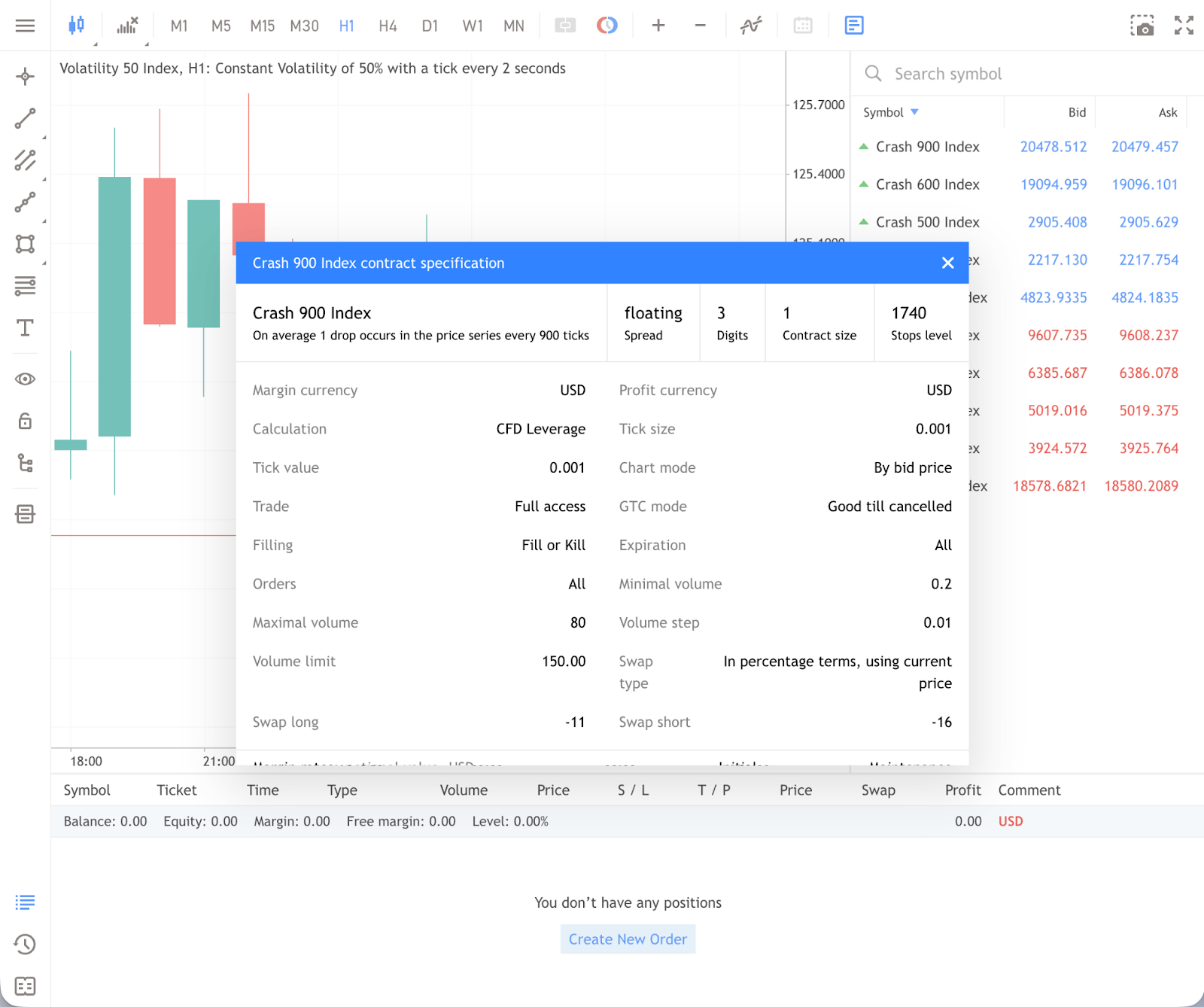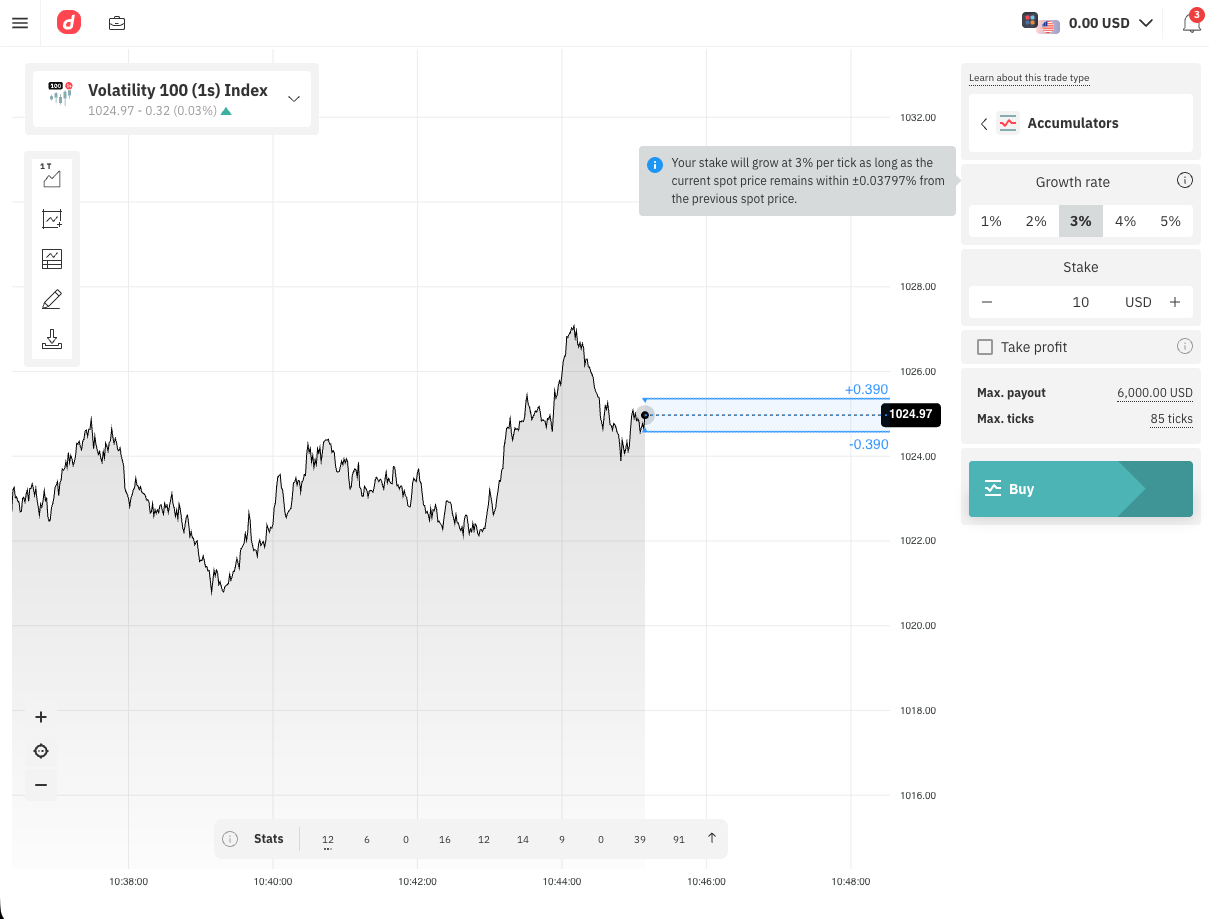Deriv 合成指數槓桿詳解

許多交易者在尋找合適槓桿時常感到困難:槓桿太低限制機會,槓桿太高則增加風險。Deriv 的合成指數透過根據波動性調整的專屬槓桿,協助解決這個問題。結果是,Deriv MT5 和 Deriv Trader 的交易者能精確控制曝險,同時避免不必要的風險。本文將說明 Deriv 的槓桿模式如何運作、與其他券商的比較,以及交易者如何負責任地運用槓桿。
重點摘要
- Deriv 在各平台提供符號專屬槓桿,協助交易者有效管理資金。
- 2024 年 4 月 Deriv MT5 更新提升了大多數指數的槓桿,但為穩定 Jump 100 的波動性而收緊其槓桿。
- 該模式與全球透明化趨勢一致,採用數據驅動的保證金邏輯及內建安全機制。
- 聰明運用槓桿,結合良好的部位規模與停損設置,可帶來可持續的成果。
以下說明 Deriv 的槓桿結構在當今交易市場中的獨特之處。
Deriv 如何在合成指數槓桿領域領先?
Deriv 已花費超過二十年時間精煉其合成指數模式。像 Volatility 75、Crash 500、Boom 1000 和 Step Index 等指數,皆由經審核的隨機數引擎驅動,模擬真實市場行為且不受外部影響。
Deriv 的槓桿並非一體適用,而是根據每個商品量身訂做:
- 較高槓桿:穩定指數(Volatility 25、50)
- 中等槓桿:中等波動市場(Crash/Boom)
- 較低槓桿:跳躍型資產(Jump 指數)
根據 Deriv 2025 年第一季數據:
- 68% 交易者使用低於 1:500 的槓桿
- 24% 介於 1:500 至 1:1000 之間
- 僅 8% 超過 1:1000
「槓桿不是威力工具,而是精密儀器。維持在 1:500 以下槓桿的交易者,資本成長通常更穩健。重點不是規模,而是紀律。」 - Wafaa Elashry,Deriv 資深產品分析師
簡而言之,Deriv 靈活的槓桿結構讓交易者能精確控管風險,同時保障安全。
表 1 – Deriv 與全球券商比較
| 功能 | Deriv(合成指數) | 典型 CFD 券商(ESMA/ASIC) |
|---|---|---|
| 槓桿範圍 | 符號專屬;最高 1:2000 | 固定上限(1:30 – 1:10) |
| 可用性 | 24/7 全天候交易 | 僅限平日 |
| 風險校準 | 演算法波動分級 | 固定監管分級 |
| 保護措施 | NBP、保證金警示 | NBP、保證金強制平倉 |
| 透明度 | 平台內規格說明 | 依資產類別通用 |
Deriv 的槓桿在全球如何比較?
大多數券商在歐盟/英國受限於 1:30 槓桿,在澳洲則為 1:100。
Deriv 採用其Derived 帳戶模式,槓桿可依商品調整,靈活度與每個指數的波動性相符。
「我們的彈性來自持續監控。每個指數都會不斷審查,以確保槓桿安全且合宜。」 - Syed Mustafa Imam,數據工程專家
Deriv MT5 和 Deriv Trader 均即時應用此邏輯,讓交易者在下單前清楚看到所需保證金。
Deriv MT5 槓桿在不同合成指數類型上的運作方式?
Volatility 100 指數在 1:1000 槓桿下,10,000 美元部位僅需 10 美元保證金,0.1%保證金要求。
Jump 100 指數在 1:250 槓桿下,相同曝險需 40 美元保證金,或0.4% 保證金,反映更高波動性。

「保證金效率讓你持續參與市場。提前規劃保證金,避免因波動性被強制平倉。」 - Prince Coching,資深交易專家
表 2 – 各合成指數類型槓桿範圍
| 指數類型 | 波動特性 | 典型槓桿範圍 | 備註 |
|---|---|---|---|
| Volatility 指數(10–250) | 穩定、演算法波動 | 1:250–1:5000 | 適合趨勢與突破策略 |
| Crash/Boom 指數(150–1000) | 突發方向性波動 | 1:100–1:2000 | 中等槓桿以管理波動頻率 |
| Jump 指數(10–100) | 高強度波動爆發 | 1:250–1:2500 | 因跳躍頻率而降低槓桿 |
| Step 指數(100–500) | 均勻小幅價格變動 | 1:2000–1:10000 | 精準交易的穩定曝險 |
總結來說,Deriv 的槓桿與保證金比率根據各指數波動性設計,確保穩定與機會並存。
在 Deriv 交易合成指數時,如何管理槓桿風險?
槓桿會放大潛在獲利與虧損,因此控管至關重要。Deriv 的安全機制有助於風險管理,但良好習慣才是長久之道。
平台內安全機制
- 強制平倉觸發: 若權益低於約 50%,自動平倉。
- 負餘額保護: 損失永不超過存款。
- 保證金警示: 臨界前發出警告。
Deriv 數據(2025 年第一季)
- 強制平倉前平均保證金水位:68%
- 停損使用率:82% 交易者
- 過度槓桿帳戶的中位回撤:23%
最佳實踐
- 保持保證金水位 > 300%。
- 長線交易槓桿限制在 ≤ 1:500。
- 避免高槓桿相關部位(如 Vol 75 + Boom 1000)。
「風險不只是槓桿,更是專注。持續追蹤保證金並分散投資者,壽命更長。」 - Felicia Tanwijaya,風險分析專家
Deriv MT5 和 Deriv Trader 均顯示即時保證金數據,協助交易者維持安全範圍。
總結來說,Deriv 生態系統結合自動化與風險意識,是風險管理的最佳組合。
Deriv 的保證金要求與曝險水位如何運作?
在 Deriv MT5
- 市場報價 → 規格 顯示合約規模、保證金百分比與強制平倉水位。
- 下單視窗 執行前顯示所需保證金。
- 終端機 → 交易分頁 顯示即時保證金水位與警示。

在 Deriv Trader
- 點擊合約旁的 (ℹ️) 可查看槓桿與賠付細節。
- 模擬帳戶與真實規格同步,適合練習。

表 3 – 保證金計算實例
| 範例 | 細節 | 重點 |
|---|---|---|
| Volatility 100 指數(1:1000) | 1,000 美元餘額 → 2 手 = 2 美元保證金 → 1% 變動 = ±20 美元 | 高槓桿,低保證金成本 |
| Jump 100 指數(1:250) | 同樣餘額 → 1 手 = 4 美元保證金 → −3% 變動 = −30 美元 | 低槓桿,高波動性 |
| 組合投資組合 | Vol 75(1:1000)+ Crash 500(1:400)→ 保證金約 3.5 美元 | 跨指數平衡曝險 |
這些模擬案例能給交易者什麼啟示?
案例 1:平衡運用
- Lena,東南亞 – Vol 50,1:2500 槓桿,1:3 風險報酬比,始終設停損。
- 結果: 3 個月獲利 +18%,回撤極小。
案例 2:過度槓桿
- Ray,拉丁美洲 – Boom 1000,1:600,無停損,3 個部位。
- 結果: 65% 保證金自動強平;單日資本減少 25%。
案例 3:聰明分散
- Aisha,中東 – Vol 10、75 及 Step Index 各 1:500,單筆交易風險 1%。
- 結果: 月月穩定成長,低回撤。
總結來說,紀律的保證金管理帶來長期穩定績效。
2025–2026 年 Deriv 槓桿系統有何新發展?
作為Deriv 2025–2026 路線圖的一部分,公司正優化槓桿引擎,以符合現代市場動態與風險校準標準。
即將更新:
- 動態分級: 槓桿會根據交易量與波動性自動調整。
- 即時保證金儀表板: 依指數家族顯示曝險熱區圖。
- AI 提示: 當投資組合槓桿超過安全範圍時發出警告。
- 新指數:「宏觀波動」與「能源波動」(測試中)。
「槓桿將變得更具適應性,」產品負責人 Priyanka Shrivastava 預測。「比率將反映每位交易者的歷史與風險輪廓。」
免責聲明:
本部落格文章所載資訊僅供教育用途,並非財務或投資建議。
本資訊於發佈日被認為準確無誤。發佈後若有情況變動,可能影響資訊正確性。
Deriv MT5 的可用性可能取決於您的居住國家。
交易具有風險。
MT5 平台上的 Derived 及 Swap-Free 帳戶不對歐盟居民開放。
交易條件、產品及平台可能因居住國家而異。詳情請參閱 deriv.com



